When I was younger, I often felt self-conscious and socially awkward. In fact, one of the reasons I wanted to become a Behavioral Scientist was to be better socially.
If you often feel anxious and embarrassed, this guide is for you. It will give you the tools you need to be more relaxed in social settings, get out of your head and into the conversation.
This guide is for anyone who’s feeling overly self-aware, but examples are geared toward adults in work or at college.
Note: Sometimes, the underlying reason for self-consciousness is social anxiety. If this is the case for you, here’s our list of the best books on social anxiety.
Let’s get started!
1. Focus on someone or something
Self-consciousness comes from being overly concerned with how people see us. We worry that we won’t be seen as smart, attractive, or that others are judging us.
It can be exhausting, and with too little evidence to support the argument in either direction, we go straight to the most negative conclusion.
To get out of this pessimistic mindset, try shifting your attention to the people around you and your environment.
Focus not on what others think of you but on learning about the people you’re with. Make it a point to find out one thing about every person you meet. It could be their job, their major, or what they did on the weekend.
The objective is to get out of your head. Put that energy into the people around you rather than into feeding an inner dialogue that’s holding you back.
2. Question your inner critical voice
It’s easy to believe the negative voice inside our head is always right. But have you tried questioning it? You might find out that it has little to do with what’s real.
Check the evidence from your life:
Can you recall a time you did something that proves your inner critic wrong? For example, if your voice says, “I always mess up around people,” remind yourself of a time when you did just fine.
Ask yourself if what you are feeling is reasonable. Or, are you letting a perception you think others have of you, run the story in your head?
3. Know that people notice you less than you think
In an experiment, students were asked to wear an embarrassing t-shirt.
By the end of the day, the students who wore the shirts estimated that 46% of the class had noticed. When polled, only 23% of their mates actually had.[1] In other words, their embarrassing t-shirt was only half as noticeable as they had thought.
What feels mortifying to us is usually having little to no impact on others. People are caught up in their own thoughts and struggles, too busy to worry about ours. The best thing we can do is remind ourselves that no one cares as much as we do, and even our own filter is not a perfect lens.
4. Know that it’s OK to say some stupid things
I remember talking to a girl I was crushing on when I was in high school. She was talking about how her brother liked a band, and like a crazy person, I said, “Ya, I know.” Like somehow, I knew what group her brother liked. My crush looked at me strangely but kept going.
Did it make any difference to my crush? Not really. At this point, I can laugh about it, but at the time it felt humiliating.
Try turning the tables on the situation. Would you care if someone blurted out something silly? Or would it just pass you by without giving it extra thought? It’s better to talk freely even if you say something stupid every once in a while. The alternative is to always guard yourself, and that can make you come off as stiff and aloof.
5. Don’t try to fight your feelings
Emotions tend to cling harder when we fight them and weaken when we accept them.[2]
When you are anxious, and feeling uncomfortable in a social setting, what are you thinking about? How does thinking about that make you feel? Happy, sad, nervous, jealous? What’s your body doing when you’re in your head and feeling awkward at a party? Are you sweating, jumpy, yawning a lot (a reaction to nerves)?
Simply accept how you feel rather than trying to change it.
Now focus outward. Talk to someone. Ask them how they’re doing. What brings them to this party/event? Do they know anyone? Then check your head. How do you feel when you’re talking to someone? Do you get any less nervous as the conversation goes on? If you were blushing, has it subsided yet?
Practice going back and forth between your inner thoughts and how you feel when you are talking to others. See if you feel better when you’re in your head, listening to your internal dialogue, or when you’re spending your energy on others.
6. Focus on your positive traits
This isn’t “think happy thoughts, and you’ll be fine.” Instead, you want to base your self-worth on your real, positive qualities rather than cynical and questionable self-talk. This is what we know is true:
- You have talents and abilities that give you fundamental value.
- This combination of characteristics makes you unique and memorable.
- You are worth spending time with and knowing.
Try to list your concrete skills like your mathematical ability, you’re a good writer, you’re multilingual, you’re a great cook. Then there are your personality traits. You’re kind, honest, genuine, funny, enthusiastic, etc.
Even if you can’t make a full list today, write one positive quality down every day and then review the list every week. When you have a comprehensive list, read it every day. You’re training your mind to focus on what you do well and to be able to access it quickly.
7. Make sure you’re reading the situation right
Negative experiences can teach us to be on guard and defend ourselves from criticism and hurt. This can affect how we perceive the world and the people we encounter.
Those of us who are overly self-conscious might believe the world will judge us harshly because that is what we’ve experienced. However, as I’ve pointed out, people don’t care that much about how we act or what we say. Every new person you meet thinks of you as a blank slate.
When you’re in a scary social situation, ask yourself, “Is there a chance my past experience is affecting how I’m seeing this interaction? Is there another, more realistic way I can approach his conversation?”
Believe people will be friendly, and most of the time, they will be. If not, it says more about them than you.
8. See yourself as a social observer
People watching is fascinating, and it shows us how our basic humanity makes us all messy, foolish, and funny. Go to the mall, grab a coffee/tea, and watch people walk with their friends. Listen in as they sit beside you and talk, or as they chase their kids down the hall.
Now notice their body language, their tone of voice, and eavesdrop on what they’re saying. What we’re doing is training you to switch your focus from yourself to others and to think objectively about what you’re witnessing.
Are people relaxed or stilted? Is their posture good, or are they slouching? When they talk, are they quiet, or does the volume go up and down with excitement? The more we see others being their imperfect selves, the more we’ll realize this is what ‘normal’ looks like.
Go into this observer mode when you walk into a room of strangers. It can help you be less self-conscious.
9. Assume that people will like you
This one is about the mechanics of being seen as confident rather than inhibited or self-conscious. When we feel uncomfortable, it can make us talk softer, hug our bodies with our arms, and speak faster to get the words out and move the focus off us as soon as possible. It can make us seem aloof, and even if we don’t intend to, it makes us less approachable.
Be confident and friendly right off the bat. Walk up to people with a warm smile and present yourself. If you’re uncertain about the details, look at how likable, confident people do it and learn from them. Assuming people will like you is a self-fulfilling prophecy. Assuming they won’t is, too.
10. Ask about others to take the focus off you
It’s easier to focus on someone else other than ourselves. When you meet someone for the first time, ask them what they do for fun. What are their hobbies, or do they have any pets? Listen carefully, nod, and give them signs that you are enjoying their story. Then add anything relevant that applies from your life. Things like your pets – what kind are they, their name, breed…or your hobbies. At the end of the day, you want to have a balance between learning about them and sharing about yourself.
The goal is to learn about someone else because it’s hard to be self-conscious when you’re focused on getting to know another’s interests and stories.
11. Make internal progress checks, not comparisons
Jealousy is a miserable emotion. It makes you feel small and worthless and sucks the joy out of everything. It’s like anger directed at someone else, but you are the one who feels crappy.
Avoid both overexaggerating someone else’s talents or trying to find flaws in them to make yourself feel better. No one is perfect, and tearing them down when you feel envious just retains the focus on you because you are still comparing yourself to someone else.
Here’s a thought: What if we were OK with the fact that someone is more accomplished than us? When we accept this, it helps us see ourselves differently.
Our value then has nothing to do with how successful we are or how good we are at something. We want to go from “I like myself because I’m good at…” to “I like myself.” (Period.) This makes our self-acceptance unconditional.
How do we accept that others are more accomplished than us and be OK with that? First, let that fact sink in, and allow all your emotions of envy and sadness to come to you. Accept those emotions rather than fight them. Now, you no longer need to fear them. Afterward, you will be less prone to comparisons.
Here’s another way to do it:
Instead of thinking, “Well, at least I’m better than them when it comes to X.” Say, “I’m not good at everything, which is OK because my value isn’t based on my achievements. I have value because I am 100% myself”.
Let’s talk more about how to be more self-accepting…
12. Practice accepting yourself
Self-acceptance is one of the biggest steps we take towards achieving self-confidence.
According to Aaron Karmin, MA, LCPC, a psychotherapist in Chicago, Ill, a person “who accepts [themselves] unconditionally as a worthwhile human in spite of [their] faults and imperfections does not experience the stress of self-consciousness.”.[3]
Here are some things you can do to accept yourself:
- Decide how you are going to live your life. Will you let others define your personal image, your strengths, and your weaknesses? Try to move from blame, doubt, and shame to tolerance, acceptance, and trust.
- Make a list of all your good points.
- What do you do well?
- What are you proud of accomplishing?
- Whose lives have you made better?
- Connections you’ve made with others.
- Hardships you have overcome.
Review the list often, so you see your progress and acknowledge your gifts.
- Take an inventory of the people close to you.
- Are they good for you?
- Do they reinforce negative self-talk?
- Do they criticize or demean you?
Consider eliminating all the negative influences in your life.
- Surround yourself with a positive support group of people who celebrate you.
- Forgive yourself. If you made a mistake, realize you did your best with the information you had at the time, or you simply made a bad choice. But now you chose to move on and forgive yourself.
- Silence your inner critic. Just because it’s hard to hear doesn’t mean it’s right or 100% true. If you wouldn’t talk to someone else like you speak to yourself, why is it OK to do it to you? You’re human like everyone else. Treat yourself as well as you treat anyone else, if not better.
- Move on from your unrealized dreams. You can’t change the past. All you can do is move forward and continue to pursue your current goals.
- Help yourself see how you make others’ lives better. It’s harder to see yourself in a harsh light when you acknowledge all the good you do.
- Let it go – You can’t control everything. It’s not resignation. It’s a realization that your energy is better spent elsewhere instead of railing against the things you can’t change.
- Try to solve your problems one at a time. First, step outside your head where all the worry and self-doubt resides. Take a dispassionate look at what you need to do to move past each issue. You could even try imagining that the problems you’re facing are someone else’s (if that helps you get away from your internal thoughts). Ask yourself what advice you’d give them (yourself) to help?
- Practice Self-compassion – accept your flaws and love yourself anyway. Simple words, but for most of us, it takes years, if not a lifetime to master this step. The more you do it, the better you’ll get in every respect.
- Even though you may not have much experience being kind and compassionate with yourself, you will start to believe these good things you’re telling yourself. Especially if you keep this positive internal monologue up. In many instances, it took years to get to this place of insecurity. It will likely take weeks and months to see progress and make permanent changes to your mental habits.
13. Practice thinking about other’s needs
Try doing thoughtful things for others. Consider their struggles, worries, dreams or regrets. When you do, you take the focus off yourself and you’ll connect with them. This will help you be less self-conscious.[4] It will also show others that you are caring, and you value them. Done selflessly, it will bring good things back to you.
Here are some suggestions:
- Smiling at someone after you meet them. It could be a friend, family member, or acquaintance. Let the smile happen as you talk to them, so they know you are smiling just for them because it grows after you say, ‘Hi.’
- Hold a door for someone.
- Give a spontaneous compliment.
- Bring a friend or co-worker cookies or a pre-made dinner if they are sick or need a pick-me-up.
- Pay it forward. Pay for the coffee or drive-thru meal of the people behind you.
- Keep your area tidy and organized if you work in an open-concept office.
- Send cards for different occasions or for no occasion at all.
- Give someone 100% of your attention and note what they say so you can follow up later. (Ask them how ‘it’ went. Make sure they are OK afterward.)
- Consciously spend a few minutes every day thinking of the things you are grateful for.
A word of caution: Do not do these things to gain others’ approval. That puts the focus back on you. Do it out of sincere consideration for others. The purpose of the exercise is to focus on others and their well-being. When you do, you’ll become more compassionate and less self-conscious.
14. Consider talking to a Therapist
If your self-consciousness is inhibiting you or is a result of social anxiety, a therapist can be helpful. Having social anxiety is more common than we think, and deciding to understand and address the effect it has on your life is brave. A Psychologist or a Therapist will help you talk through your feelings, find out where they originate from, and give you the tools to unpack them and move forward.
We recommend BetterHelp for online therapy, since they offer unlimited messaging and a weekly session, and are cheaper than going to a therapist's office.
Their plans start at $64 per week. If you use this link, you get 20% off your first month at BetterHelp + a $50 coupon valid for any SocialSelf course: Click here to learn more about BetterHelp.
(To receive your $50 SocialSelf coupon, sign up with our link. Then, email BetterHelp’s order confirmation to us to receive your personal code. You can use this code for any of our courses.)
You can also try contacting your insurance company or doctor for recommendations.
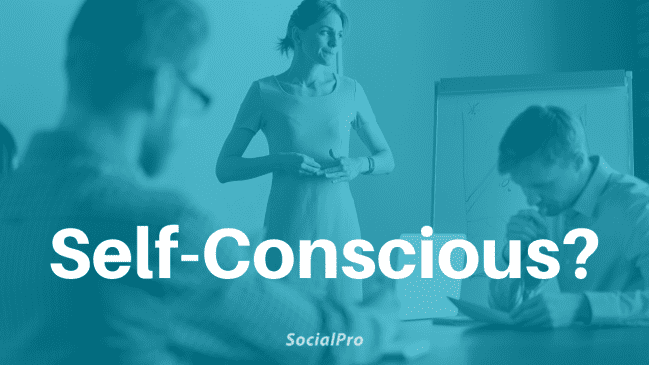





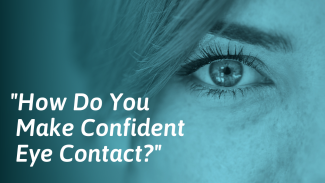
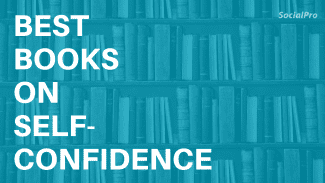
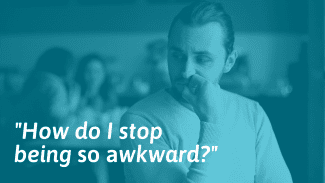
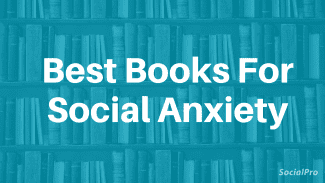
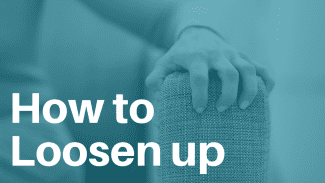
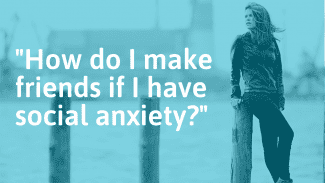
I’m bad at talking with people, I’m pretty much the quiet guy, I don’t know what to say, I’m afraid to say something wrong, that’ll make me look stupid and the other person just laughs at me or judges me. I’m afraid to come out as weird.
I feel yaaa..lol
I panic that I’m going to get into a social situation and my mind will go blank on extremely easy subjects. Like what’s your name? *Blank* Where are you from? *Blank* and then I’ll have to panic and run out of the room and it will be really weird. I guess the fear is being perceived as an idiot, or like an unconfident weirdo with nothing to say, and then the anxiety that I feel physically really takes over.
I’m insecure and scared about how people perceive me and that if I do anything weird or out of place around people who I care about that they won’t care about me and I would have to fight on my own when it comes to anything. I guess I’m too afraid of losing more than what I already have. I’ve always felt caged In my own thoughts and feelings that I don’t look at the bigger picture and think about anyone else’s thoughts/feelings and I’m too caught up in my own thoughts. I don’t want to be this person anymore because it’s destroying my life and pushing everyone I know and love away.
(I know there’s more but I can’t really pinpoint it)
To who’s reading this I hope you understand
I don’t know what to say to certain people. When I try to say something to certain people I overthink it. But it’s usually random what I say. And then they just look at me like I’m crazy. But also I accidentally stare at people to analyze them in my head. Which .always people uncomfortable 🥺.
I’m afraid of people rejecting me when I put myself out there. I’m afraid of people looking at me judging me and talking about me to other people.
I get anxious people will realize how anxious I am…. lol… And decide that I´m awkward for being anxious… Imagine the snowball effect!
I focus so much on what a person is telling me that I forget to actually listen. And then I panic because everyone else around me seems to have the conversation thing down pat and then I start to doubt myself thinking “they are all thinking I’m an idiot”
I have trouble with picking up on social cues and I tend to get nervous and sometimes interrupt or talk over them, not meaning to but just trying to keep up with the topic or conversation. Sometimes I find myself not having a clue what is being said and I get lost on the topic. I find myself constantly nervous or dealing with anxiety. Socializing has always been challenging for me.
Hi Heidi
This happens to me all the time! Around certain people is really bad, I seem to lose control of what I am saying because I panic.
I’m afraid of saying the wrong thing or not saying enough!! I’m afraid I will forget what I’m going to say (which most of the time I do) will it make sense etc… I’m afraid I’m going to sound stupid! I’m afraid I just can’t carry on a conversation with whoever I’m talking to and most of the time I can’t!! What is wrong with me? Why can’t I?
I hear you.
Conversation puts my mind into overdrive of what would “normal” people say/do because I don’t feel like I fit. It’s like a snake biting its own tail
I am afraid of being judged about anything my weight am I boring I’m not likable the list goes on I want to be more approachable which I think maybe I’m not
I have always been awkward without even knowing it. My biggest fear around others is being judged. It’s been a hard road lately because I used to weigh almost 300lbs. I recently lost 130lbs. I look completely different and it made me realize that strangers were judging me based on looks alone. People treat me differently now. It’s a sad realization when you finally see that you were treated differently just because of how you look. It made me realize how judgmental and biased so many people are, and that scares me.
I feel like people can smell my desperation. I don’t want to be pitied.
When I’m in a conversation with someone and we both run out of things to say, I will start blurting out random things so it’s not as awkward.
When I have a conversation and run out of things to say. I start to panic. I blame myself. The silence is frightening. And just thinking the other person finds me boring. Kind regards Alan.
God is good and he is changing my life everyday
I become extremely nervous around people who think that I’m a shy person. So, I’m more comfortable around strangers than people who know me as there is no fear of judgment.
I’m afraid I might come off as weird before I can even try to talk to people because I’m not at all good at covering my socaly-aqwardness and anxiousness and I’m scared people wont find me interesting when I talk to them because I like anime and games and art but almost everyone else is into stuff like social media and I get people have different interests but that fact makes it hard to keep a conversation going tho I really cant get a conversation started I feel like I come off as creepy if I try to start a conversation with them and I back out if their in groups because their talking to each other already
I understand, i like video games and working on vehicles but i also like sparkly dresses and cute shoes. I feel like people will think I’m strange for having such diverse interests.
I’m afraid that my friends will criticize something I say if it isn’t incredibly witty or clever and I’m thinking about how I need to get them to like me or I’ll be low on the group hierarchy. I’m afraid I will say something that they make fun of and make a big thing. When I do say something they like I’m afraid I’ll skrew it up with what I say next.
I feel socially awkward around groups of people. I don’t know what to say to strike up a conversation and know that small talk doesn’t last. Leading to awkward silence. I feel that before I open my mouth, people have already judged me on my outward appearance. So I choose to stay home and away from people when I can and only go out when necessary. It’s been this way for so long, I don’t know where to start for myself.
I am scared to make new friends for fear they make not like me once I talk with them and they get to know me. So I end up making hashed friendly conversations and fleeing them and avoiding them whenever our paths meet. End up with the similar scenario.
I so understand this. I have very few people I can call true friends (Acquaintances at best) but only one I can truly call anytime if I’m having a bad moment. I was isolated for so long by my ex (left him on Dec 27, 2021, due to the abuse he put me through after being married for 25 years) that I truly have no clue how to meet and make friends. I don’t feel comfortable at my own home when alone (the kids go to their dad’s every weekend) but yet I have no one to go hang out with either and don’t know how to find people to do so.
Michele, you are not alone. I feel the same way when I’m around groups of strangers. I sometimes feel this way around groups of friends, especially if there are pretty girls in the group. I get super self-conscious and hope not to mess anything up by saying something “stupid”.
It’s so bad, that I sometimes feel I may die alone, with no one to care for or who cares. It’s just me and my dog. And personally, sometimes I like it that way. The people in this world are just too much and too much is going on.
I know your pain well and I am so sorry. Wish I had the magic words to help. Sending peace and love your way. 🤗
Well… I’m afraid to mess up every wrong word a wrong time I said it it will affect the person I talk to and will affect our relationship so I try to be more concentrated on it may be living in an introverted family that is afraid of “what will people say ” “what will people think” affected me in a way so exercise on the social situation is so hard and will i don’t know what to do I don’t wanna be lonely when I grow up and be stuck with only the family